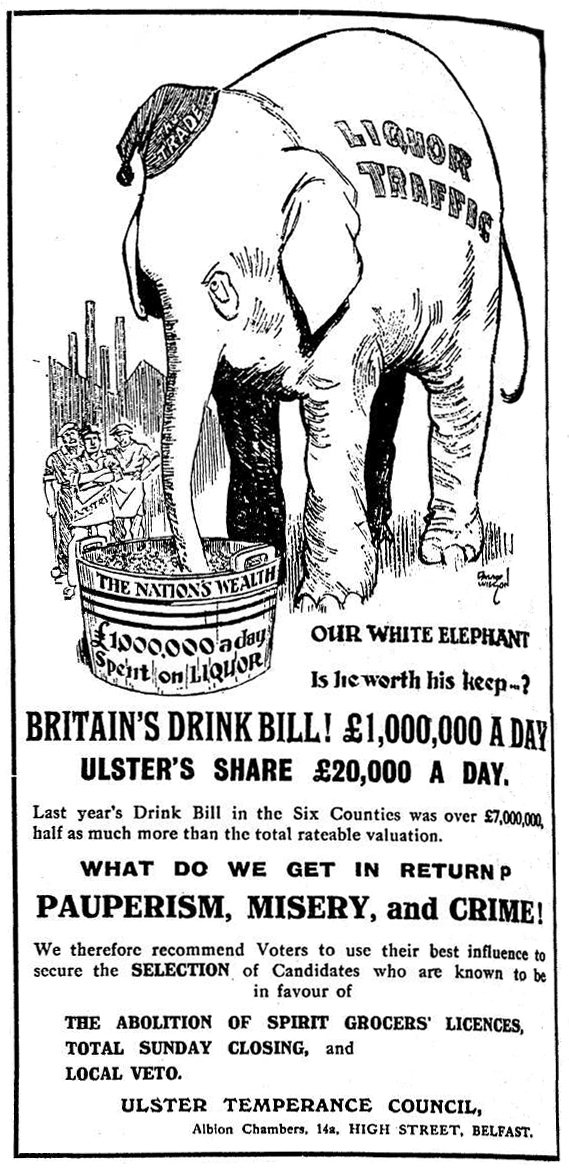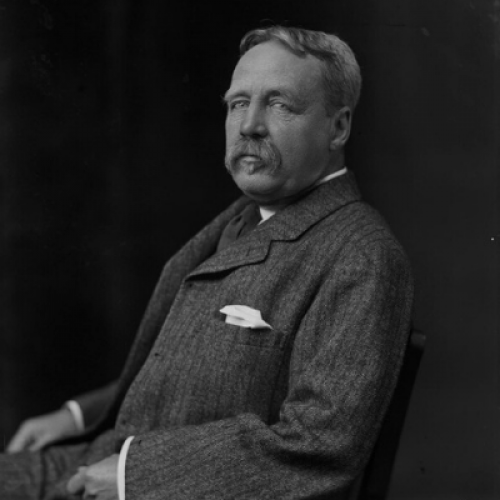The Reformation of Public Houses
15 February 1921

Belfast News-Letter, 15 February 1921
The Ulster Temperance Council was founded in 1917, part of a wider worldwide movement by different groups to prohibit the sale and consumption of alcohol. Its members associated alcohol with various social evils, which it summarised as ‘misery, pauperism and greed’. In 1921 it began a campaign for ‘temperance reform’, targeting the licenses of spirit-grocers, which were run predominantly by Catholics. Sir Robert John Kennedy of Cultra responded to this campaign in a letter to the Council, published in the Belfast News-Letter, in which he called for a more practical response to the problems caused by excessive drinking.
Temperance Reform
Sir – At the request of several friends holding divergent views on the temperance question, I enclose for publication a letter which, on the 4th inst. I wrote to the Ulster Temperance Council. As regards grocers’ licenses, I desire, at the suggestion of some of my critics, to make it clear that I think, when they are withdrawn, the holders of them are entitled to have their claims for compensation laid before and dealt with by a competent authority.
Letter to the Council

The Hon. Secretaries, Ulster Temperance Council, 14a High Street, Belfast.
Gentlemen, I beg to acknowledge receipt of your circular letter asking me to support an effective measure of temperance reform by helping to secure candidates for the Northern Parliament who are men in genuine sympathy with the movement. I gladly take advantage of this opportunity to express what I may venture to call an unbiassed and unprejudiced view upon this important question, inasmuch as – to use a colloquial expression – I have no axe, political or commercial, to grind.
… I look upon compulsory prohibition not only as tyrannical, and therefore undemocratic, but also, for reasons upon which I need not now dwell, as unpractical. But subject to these reservations, I cordially advocate temperance reform, and I have read with respectful interest your recent manifesto. ...
Spirit-Grocers’ Licenses
These, I agree, should be abolished. They are the source of incalculable evils … they encourage people to do secretly what they are afraid to do, or, under prohibition would be unable to do openly, viz purchase and indulge in strong drink. Thus, to the crime of drunkenness there is added, under spirit grocers’ licenses, the sin of habitual deceit. … Upon the point of the abolition of grocers’ spirit licenses I am therefore in hearty sympathy with your association. ...
The Reformation of Public Houses
Closing public-houses on a Sunday. This in itself is highly desirable, but it cannot be effected by a stroke of the pen without inflicting the greatest injustice upon the great mass of people. Supposing, for example, it were done in Belfast, it would be open to one man, probably a rich man, going into the city on Sunday, to obtain at his club all the refreshment he desires, including alcohol, whilst the working man under similar conditions is left in the streets.
I venture to think that the remedy is to be found in the reformation of public-houses on what is known as the Gothenburg system, under which, I understand, temperance refreshments and alcoholic beverages under very strict regulations can be supplied on Sundays as well as on other days. But whatever restrictions may be placed on the use of the bar in the poor man’s public refreshment-house must apply equally to the rich man’s club.
... In a word, I am heart and soul in favour of what you describe in your circular letter as temperance reform; but when you abolish an evil system you must be prepared to substitute a good one in its place.














